"The Day Big Tech Stopped Being Untouchable"
Democracy on Wednesday, Monopoly on Thursday, National Security on Friday.
Hi,
Welcome to BIG, a newsletter about the politics of monopoly and finance. If you’d like to sign up, you can do so here. Or just read on…
Today I’m going to write about we learned on Wednesday, Thursday, and Friday of this week. In sequence, Wednesday was the day of a historic Congressional hearing on big tech monopoly power, Thursday was when these firms announced blow-out earnings even in the midst of an economic collapse, and Friday saw Donald Trump announce he might ban the social media firm TikTok. That’s democracy, monopoly, and national security in sequence.
First, housekeeping. I was on Yahoo Finance and Rising with Saagar Enjeti and Krystal Ball this week, as well as Politico, the Washington Post, Bloomberg, and Business Insider. I also did an interview in a publication by Stanford Business School students, Visible Hands. I’m finding a lot of business school students and recent graduates are fascinated by anti-monopoly politics, which speaks to the unusual politics of commerce at work here.
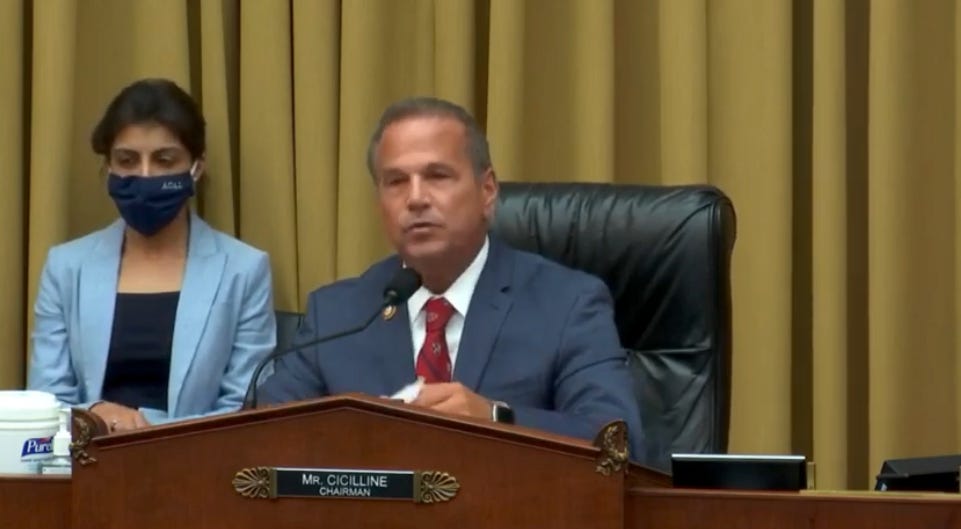
David Cicilline gavels in the hearing, flanked by his staffer Lina Khan.
“Democracy Reasserts Itself”
On Wednesday, the Chairman of the House Antitrust Subcommittee, David Cicilline, opened a hearing capping the most significant Congressional investigation into corporate power in decades, his subcommittee’s investigation of large technology platforms. In his opening statement, Cicilline made the stakes and the historical backdrop clear.
“American democracy has always been at war against monopoly power,” he said. “Throughout our history, we have recognized that concentrated markets and concentrated political control are incompatible with democratic ideals. Their ability to dictate terms, call the shots, upend entire sectors, and inspire fear represent the powers of a private government.” And then, with a flourish, he concluded, “Our founders would not bow before a king. Nor should we bow before the emperors of the online economy.”
This framing was remarkable, and exactly what I wrote about in my book Goliath: The 100-Year War Between Monopoly Power and Democracy. One of the highlights of what I found was the critical role of Congress and investigations into corporate power, which Americans had always seen as private governments rivaling our democratic government. Until this week, I had only read these ideas in transcripts of old hearings, in archives, and in interviews with old people talking to me about their youth.
And then came Wednesday. Cicilline brought a New Deal-style sensibility to these hearings, acting as a modern Wright Patman and offering the public that magical moment when public servants confront unaccountable power, and showing the promise and possibility of rule by the people. Some of the small business witnesses who had testified before the committee earlier, like David Heinemeier Hansson of Basecamp, were “blown away” by this performance, which is not a particularly common reaction to Congress these days.
It was truly an extraordinary five and a half hours, where these powerful CEOs had to answer for their misdeeds. I wrote a summary of the hearing and its importance in The Guardian the next morning.
Almost any moment of the four-hour hearing offered a stunning illustration of the extent of the bad behavior by these corporations. Take Amazon, whose CEO, Jeff Bezos, often seemed off-balance and unaware of his corporation’s own practices. Congresswoman Lucy McBath played audio of a seller on Amazon tearfully describing how her business and livelihood was arbitrarily destroyed by Amazon restricting sales of their product, for no reason the seller could discern. Bezos acted surprised, as he often did. Representative Jamie Raskin presented an email from Bezos saying about one acquisition that: “We’re buying market position not technology.” Bezos then admitted Amazon buys companies purely because of their “market position”, demonstrating that many of hundreds of acquisitions these tech companies have made were probably illegal.
Mark Zuckerberg had to confront his own emails in which he noted that Facebook’s purchase of Instagram was done to buy out a competitor. His response was that he didn’t remember, but that he imagined he was probably joking when he wrote that. One congresswoman on Joe Biden’s vice-presidential shortlist, Val Demings, asked Zuckerberg why he restricted Facebook’s tools for competitors like Pinterest, but not for non-competitors like Netflix. He had no answer. Congressman David Cicilline asked about Facebook promoting incendiary speech and making money off advertising sold next to that speech. Zuckerberg pivoted to free speech talking points, and Cicilline cut him off, “This isn’t a speech issue, it’s about your business model.”
The performance of Cicilline, as well as that of his colleagues like Pramila Jayapal and Joe Neguse, was “democracy reasserting itself,” as former Google design ethicist Tristan Harris put it on CNBC. The hearing was the sixth in a series going back a year, and it was the culmination of an investigation in which staffers had gone through millions of documents and uncovered evidence of anti-competitive behavior by Google, Amazon, Apple, and Facebook. Here is, for instance, a sample exhibit Jeff Bezos had to confront when being questioned by Rep. Mary Gay Scanlon.
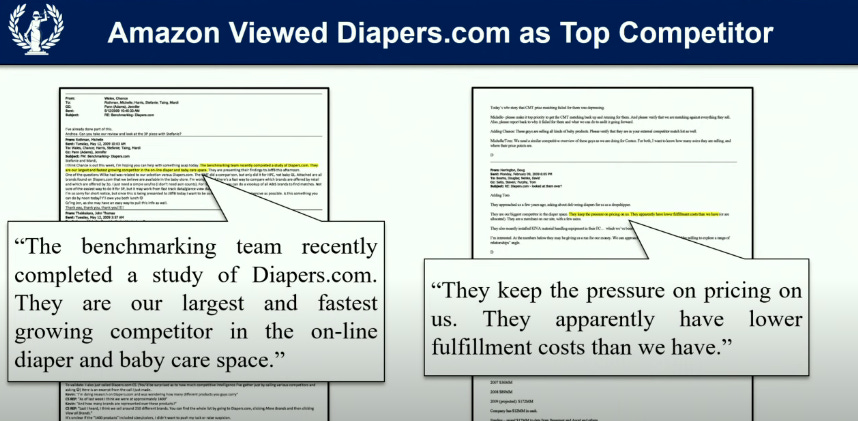
It was also a massive media event. Of course the tech press was all over it, but it was front page news on every major American newspaper, which is remarkable considering this media environment involves a global pandemic and Trump’s endless controversies.
Here’s the New York Times:
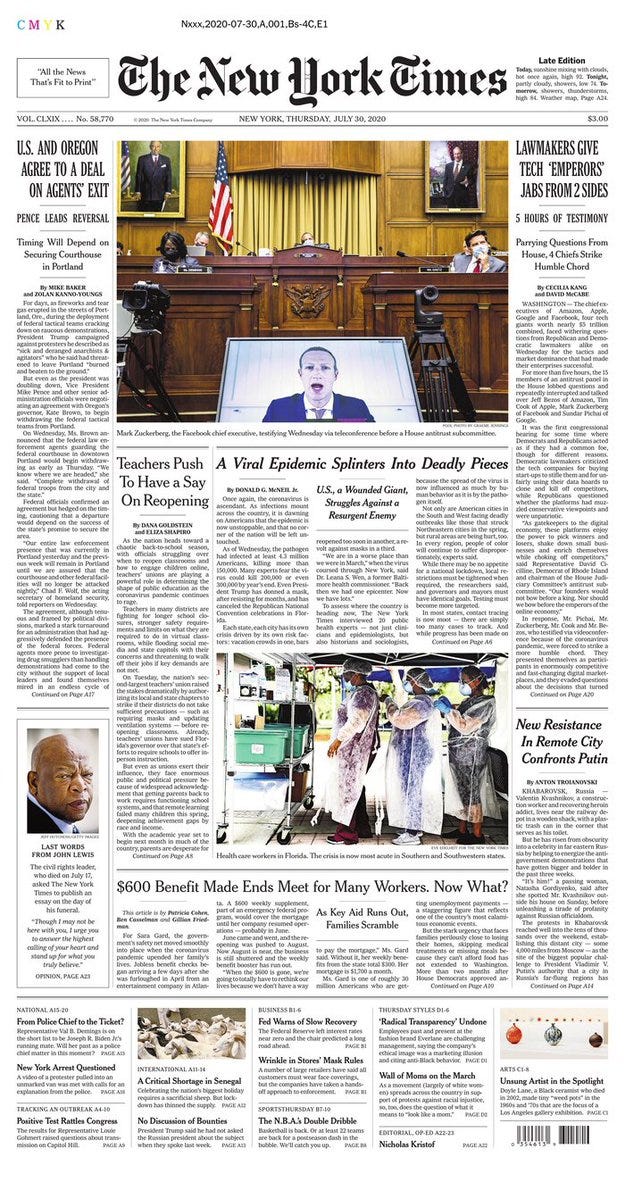
And the Wall Street Journal:
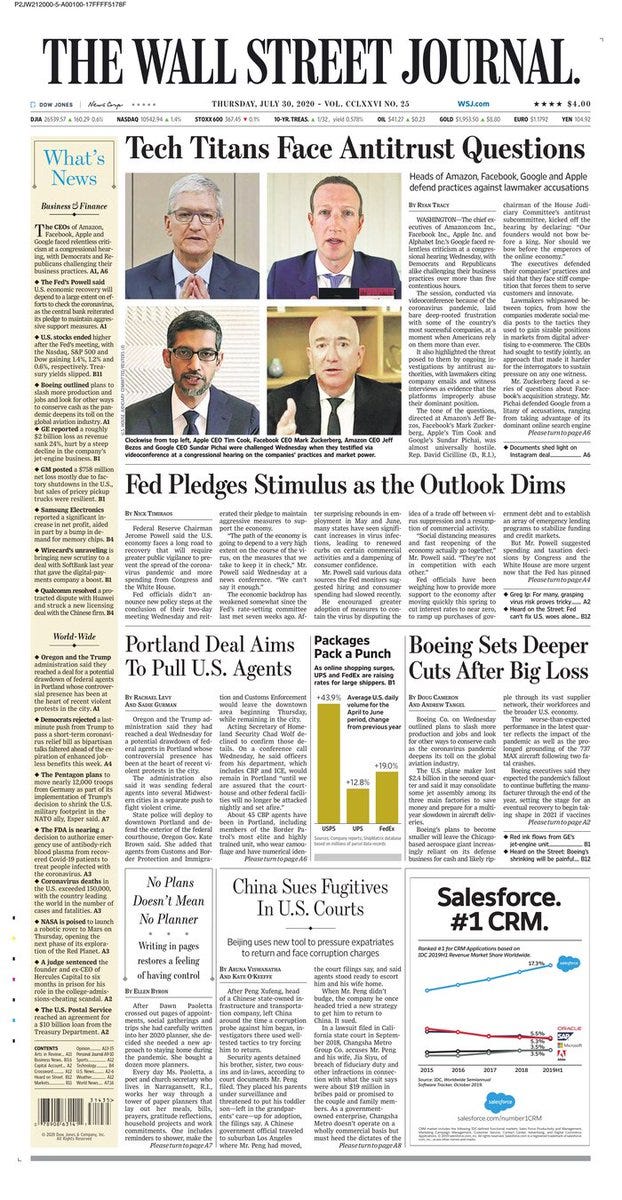
And the Washington Post:
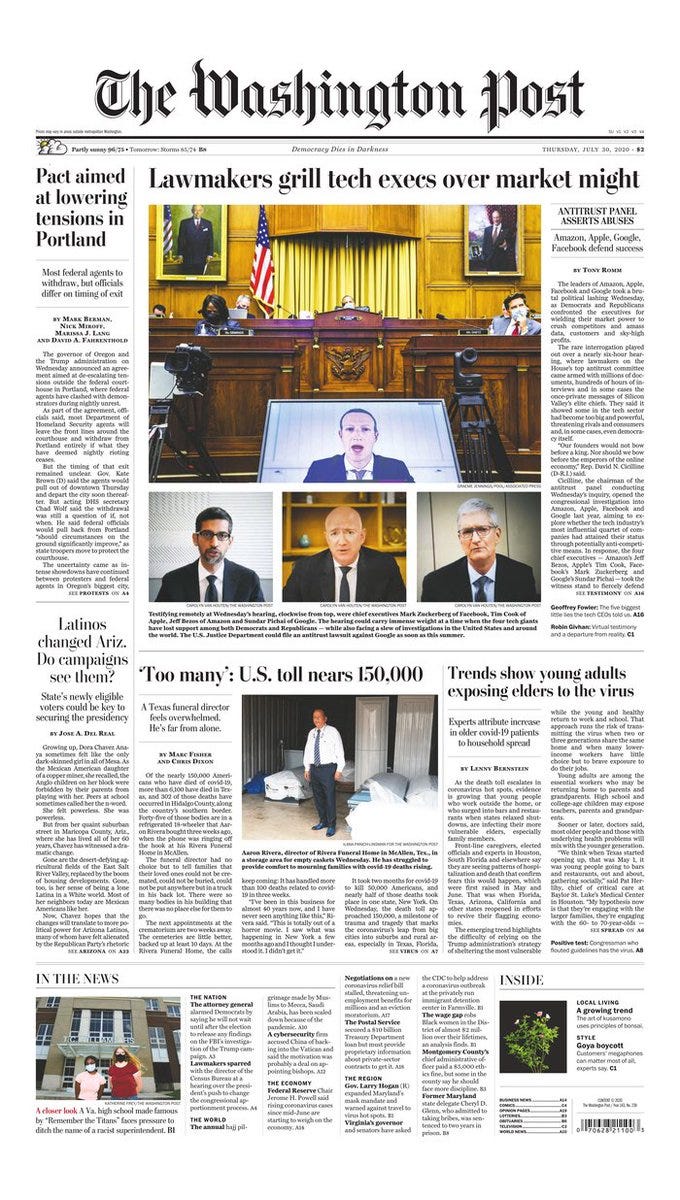
And Fox News:
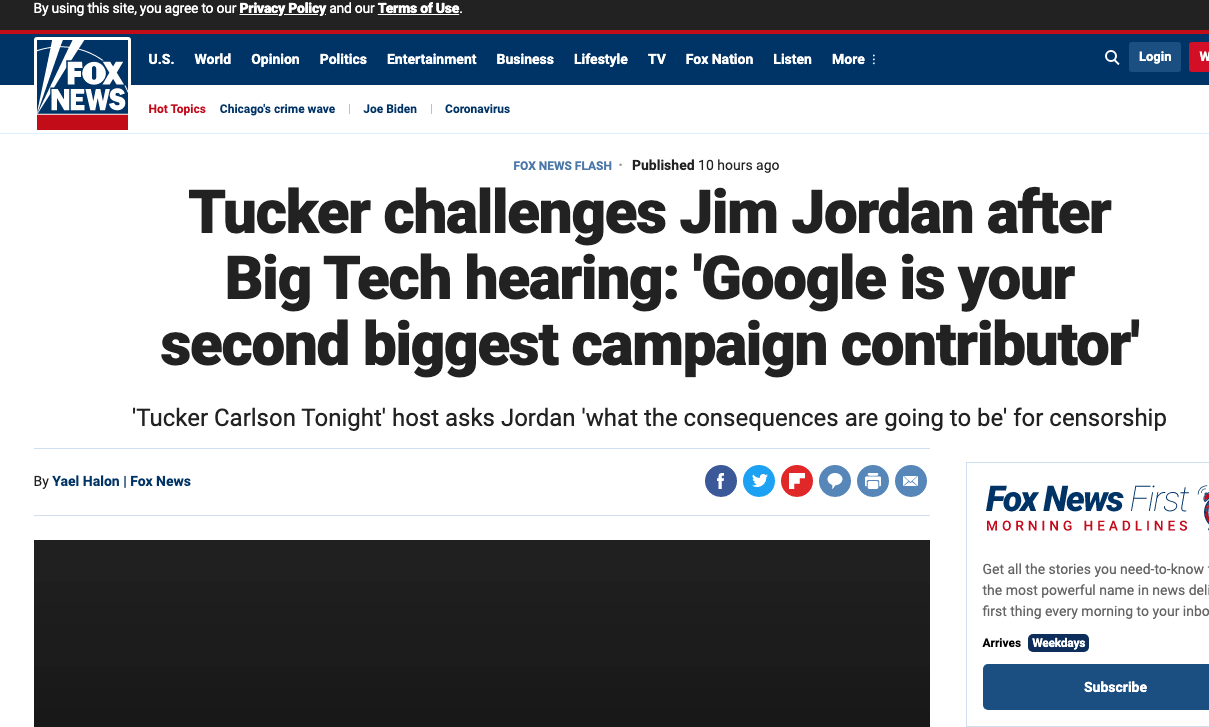
There was also significant news coverage worldwide, everywhere from India to Brazil to Germany, with the best headline coming from the Spanish newspaper El Pais: “The day when the big tech companies stopped being untouchable.”
So what is likely to emerge? Cicilline has said he wants a final report out in September, which will likely have proposals to update the antitrust laws, set rules for digital platforms, and increase funding for enforcers. His goal is to make these proposals bipartisan. While top Republican Judiciary ranking member Jim Jordan will likely refuse to strengthen antitrust law, several Republicans, such as Ken Buck and Kelly Armstrong, really understood the problems with dominant tech platforms and might be supportive.
But the hearing wasn’t just important because it may lead to new laws. It is likely to lead to enforcement of existing law. On the right, there’s increasingly chatter about the importance of the Department of Justice’s potential antitrust suit against Google.
One long-time Yelp official who has been pushing for antitrust action against Google for nearly a decade, Luther Lowe, pointed out that the antitrust agencies respond to signals from Congress. From the 1980s to the early 2010s, Congress mostly indicated it wanted lax enforcement, and the agencies eventually complied. This was true during the Obama era, when enforcers tended to defer to big tech. Cicilline made this point on lax Obama-era enforcement to Politico, saying “I think there was a sense from tech that these were new, great American companies and they were providing services that people like.”
Since 2015, that dynamic changed, and Congress has gotten more and more aggressive with the agencies. This hearing revealed deep anger at how the FTC and DOJ have done, because the documents used by the Subcommittee investigators were available to enforcers even as they approved merger after merger. Two days after the hearing, Cicilline noted, “The FTC has not done a good job.”
Going forward, in other words, enforcers are far less likely to be given the benefit of the doubt when they approve mergers or fail to bring cases.
“Earnings that Shocked Even Wall Street”
The day after the hearing, Google, Facebook, Amazon, and Apple all announced earnings. On a day an economic report came out showing that the American economy shrunk at an annualized pace of 32%, these corporations “saw their combined market value swell by $250 billion thanks to earnings that shocked even Wall Street.”
As Cristiano Lima reported, these reports validated the antitrust hearings, with Cicilline saying “They made our case for us even more… Those earning reports are further evidence that they are too big, have monopoly power and are exacting monopoly rents. ... We are seeing the consequences of corporate economic power.”
There’s very little anticipation on Wall Street that regulators will do anything to these companies. Apple CEO Tim Cook and Amazon CEO Jeff Bezos weren’t even asked about the antitrust hearings, and Sundar Pichai expressed confidence in Google’s business model. Mark Zuckerberg went even further, coming close to making threats over the possibility of restrictions on targeted ads (from either policymakers or Apple imposing new app store terms). Here’s what Zuckerberg said in his opening statement to investors on that possibility:
“It's true that making it more difficult to target ads would affect the revenue of companies like Facebook, but the much bigger cost of such a move would be to reduce the effectiveness of the ads and opportunities for small businesses to grow. This would reduce opportunities for small businesses so much that it would probably be felt at a macroeconomic level. And is that really what policymakers want in the middle of a pandemic and recession?”
So Zuckerberg is not only unapologetic, he is likely to make no meaningful change to his behavior.
Why do we see such faith in monopoly power the day after such a strong showing by Congress? Partly this is because Wall Street is confident the rule of law against the powerful has collapsed in America. And on cue, a bunch of law and economics conservative groups, likely funded by big tech, set up a new coalition to defend lax enforcement, as did the U.S. Chamber of Commerce. It’s not clear, however, how the pushback from big tech will be any different after the hearing than before; they have already bought off most of the people they can buy off.
But Wall Street’s view isn’t just based on firm faith in the guiding hand of corruption; policy inertia is real and powerful. For example, Amazon announced in its earnings press release the day after hearings showing Bezos has far too much power that the corporation got unanimous approval from the Federal Communications Commission for a $10 billion network of 3,236 low earth orbit satellites to provide global broadband. Amazon’s ambitions are endless, and policymakers just haven’t internalized what such ambition means.
But they will. Because then came Friday.
A TikTok Ban?
On Friday, Donald Trump said he would likely ban TikTok, the only real competitor to Facebook, because of concern over the Chinese government’s ability to manipulate Americans using the combination of an invasive surveillance architecture and a large social media platform.
The end game isn’t clear. There are a flurry of reports about Microsoft potentially buying the domestic operations of TikTok, which may or may not happen. Microsoft is the only big tech monopolist not on the hot seat, so I suppose it appears that such an acquisition will not reduce competition. But that’s besides the point.
Regardless of whether a ban or a spinoff of TikTok’s domestic operations happens, or whether either makes sense on policy grounds, it is evident that the era of tech platform regulation is here. Trump’s musings, and the basic support he has to take action against TikTok among most of the political class, reflects a widespread consensus that communications platforms must at some level be structured by government action, if only to make them safe on national security grounds.
The implication goes far beyond TikTok, but extends to Google, Facebook, Amazon, Twitter, and Microsoft. What these corporations do is critical infrastructure, and the public through its public institutions will be playing a major role going forward in structuring it.
So that what’s what we learned on Wednesday, Thursday, and Friday. We are going to govern big tech, big tech will not govern us.
Thanks for reading. Send me tips, stories I’ve missed, or comment by clicking on the title of this newsletter. And if you liked this issue of BIG, you can sign up here for more issues of BIG, a newsletter on how to restore fair commerce, innovation and democracy. If you really liked it, read my book, Goliath: The 100-Year War Between Monopoly Power and Democracy.
cheers,
Matt Stoller
P.S. A reader sent this my way after my last piece on Facebook’s automated ad system, and I found it interesting.
I advertise on Facebook, and I've frequently had ads held up or asked to be changed. There's some sort of review, somewhere in the process, though sometimes it seems kind of nonsensical. I posted an ad advertising my company's language classes in Attic Greek, and Facebook said that my description, which said something like, "Classical Greek isn't dead. With the Ancient Language Institute, you can learn the language Socrates spoke and in which Euripides composed his tragedies. Beginner classes start this Fall."
It got flagged as "false advertising." I can't believe that someone at FB has an axe to grind regarding the language of Ancient Athens...


You make an interesting point about MBA students; I was actually trying to go back to school for an MBA and sat in on a class back in February which literally was a student simulation of being on the board of Uber; they were being taught to concoct strategies to evade regulations before my very eyes. I feel most MBA students I've met are blinded by the idea that they can be part of a big brand and live a lucrative silicon valley lifestyle. They have no critical lens with which to view the lopsided power dynamic as dangerous. Needless to say, I withdrew my application because I am ready to provide that critical lens for them instead of embracing their blind careerism.
So you only praise the performance of Cicilline, Jayapal and Neguse, and ignore Steube, Jordan, or Armstrong? Sorry, Matt, but like almost all commentators on left or right, you’re little more than a partisan hack.
One of the most pathetic moments of the whole hearing was Scanlon calling Big Tech’s well-documented attempts to influence elections “a fringe conspiracy theory”. Jordan got righteously angry about it, and Cicilline’s came across as a clown reacting with “wear a mask!”. Cicilline’s demand that FB steps down further on freedom of speech under the disguise of fighting such “conspiracy theories” was equally pathetic; it is one of the demands that is likely to get granted.
And inasmuch as I see, Jordan was the only rep addressing the role of Big Tech in fostering cancel culture. Why Twitter and Microsoft were not even there?!